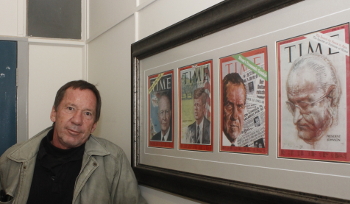Latest News Archive
Please select Category, Year, and then Month to display items
01 January 2020
|
Story Eugene Seegers
|
Photo Kaleidoscope Studios | Sonia Small
 Dr Maria Madiope took over the reins of the UFS South Campus at the beginning of January 2020.
Dr Maria Madiope took over the reins of the UFS South Campus at the beginning of January 2020.
The Council of the University of the Free State (UFS) approved the appointment of Dr Maria ‘Marinkie’ Madiope as Principal of the South Campus for Open Distance Learning (ODL) during a meeting held on 20 September 2019. Dr Madiope took over the reins of the UFS South Campus at the beginning of January 2020.
Educator at heart
Educating and empowering others are key aspects of Dr Madiope's life. She has served as the Director for University Teaching and Learning at Unisa since 2015 and takes her role incredibly seriously, achieving a transformative curriculum at the colleges under her care since her appointment.
Dr Madiope holds a PhD in Education from Unisa, with a specialisation in Didactics; her next two degrees where completed at the then RAU, which is today known as the University of Johannesburg: a BEd in 1999, followed by an MEd in 2001, both specialising in Computer-based Instruction. She previously obtained her BA Ed in 1985 and a BEd in 1988 from the University of the North. Her initial training as a teacher was from the Hebron College of Education from 1980-81.
Dr Madiope is also the editor of the only journal in ODL, Progressio, since 2016. Her expertise in E-learning is another of her strong points. Together with her team, Dr Madiope designed and developed the first online course in Curriculum Transformation, which is being piloted at Unisa. Her work has been rewarded with awards such as the Unisa Gender Activism: Advocacy and Promotion of Women’s Rights 2013, Unisa Woman of the Year 2013, and Unisa Best Performer 2013.
Dr Madiope brings with her a wealth of experience to UFS and her vision is to increase access to a wider base of learners with potentially having more African learners enrolled. The first point of call would be to have more learners coming from Lesotho and then the rest of the SADEC region, having the UFS become a leading distance-learning university. One of the key projects that Dr Madiope wishes to tackle is early childhood development. “I believe in educating educators to ensure that they are best equipped to provide the latest and relevant Early childhood and development practices that are on par with the rest of the world,” she says.
Community leader
In addition to being an experienced educator and administrator, Dr Madiope is instrumental in community projects that lie close to her heart. Whether it is large-scale advocacy for women’s rights or her personal involvement in the supply of sanitary towels for schoolgirls as part of a programme to empower the girl child through exposing them to options, it is humbling to watch her compassion in action.
She further intends to strengthen the relationship of the university with TVET Colleges and community colleges by providing mutually beneficial programmes that will up-skill those colleagues by giving them an opportunity to work with experienced UFS staff members. She says, “Reaching out to colleagues in TVET and Community colleges will offer them the opportunity to advance their lecturing and learning programmes, which will only lead to benefiting their learners and South Africa as a whole.”
Photo manipulation in journalism: evil, crutch or lifebuoy?
2017-09-04

Albe Grobbelaar, veteran journalist and lecturer in the
Department of Communication Science at the UFS.
Photo: Rulanzen Martin
Since the 1800s the manipulation of photographs has been common practice, and who can forget the OJ Simpson Time magazine cover in 1994? Albe Grobbelaar, lecturer in the Department of Communication Science at the University of the Free State (UFS), asked in a special lecture on 18 August 2017 whether “Photo manipulation in Journalism” was an evil habit, a crutch or a lifebuoy.
“As a journalist I have always been interested in photography. And the principle of photo manipulation or tampering with photos, as we call it, is something that has interested me ever since,” Grobbelaar said. Photo manipulation is an area that has garnered many academic interest and is not a new trend but a practice that started in the 1830s when photos came into popular use. “It is not always done with ulterior motives, artists played with photographs to get unique effects.” Photo manipulation is not only to create fake news, but is sometimes used to convey novelty and create shock to news readers.
Different viewpoints for different circumstances
He talked about the spectrum of viewpoints on photo manipulation. Some conservative journalism schools say photos should never be retouched while other feel it is fine to tamper with pictures. “What I tried to convey in the lecture was that one should consider different circumstances differently,” Grobbelaar said. As a journalist he believes that news photos should never be manipulated.
He mentioned the example of the mugshot of OJ Simpson that the Los Angeles Police Department released to the media. “Newsweek and Time both used the photo on their front pages, but Time deliberately darkened the picture so that OJ, a black man, would appear more sinister,” Grobbelaar said. It is, however, common practice in the fashion industry to retouch images that are used in fashion magazines.
Use own judgment to validate photos
In the age of social media it has become easy to manipulate photos and which has been labelled fake news. “I would advise people to use their own judgment when validating the authenticity of photos,” Grobbelaar said. It is important to verify whether they are from a reliable news outlet.